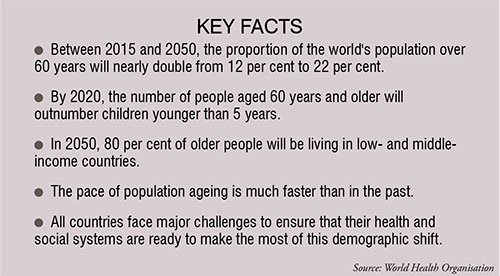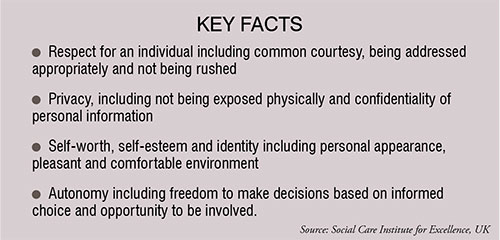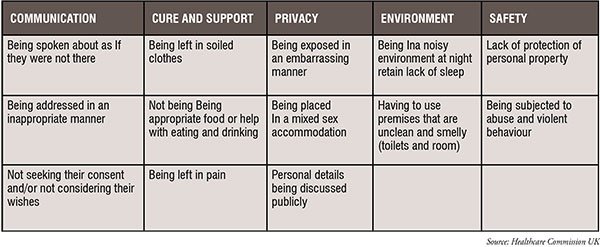Dignity in care is integral to providing person-centred care. Evidence suggests that when staff are treated with dignity, they will in turn treat service-users with dignity and respect. A blame free culture, robust leadership, good communication and a supportive environment are key ingredients for enabling staff to provide dignified care.
Longevity has been one of the greatest benefits of advances in medicine and better prevention strategies across the world. Globally population of people over 65 years is increasing at a faster rate than any other population group. More and more people are living longer albeit with co-morbidities. This means that the need for health and care services for this group is rising rapidly and is set to continue in the future. Many older people live independently in their own homes or are cared for in a residential care facility. They often need frequent admissions and sometimes long stays in the hospitals due to their health conditions. In all these settings they aspire to be treated with dignity and respect at all times. Healthcare professionals can play a key role in ensuring dignity and respect for older people. It is also important that staff are treated with dignity and respect who in turn will treat staff with the same approach. This paper looks at the concept of dignity, impact of undignified care and the role of management in enhancing dignity in a care setting.

Dignity is a complex term and means different things to different people based on their cultural background, values and attitudes. People often find it difficult to articulate what dignity means to them however, they do describe situations where their dignity was compromised. Dignity can be broadly described as below:
Being treated with dignity is a human right and should be respected at all times. Compromise in dignity has a great impact on people at the receiving end. Anecdotal evidence suggests that people may feel ignored, worthless and insignificant embarrassed, humiliated, bullied and above all powerless and scared. This is even more significant for people who may be in vulnerable situations due to their disability, age or underlying clinical conditions. It is also very important for people at the end of their life. Being involved in the decisions relating to their care, able to express their care needs, their cultural preferences respected and access to appropriate pain relief are some of the aspirations of the care recipients. As mentioned before dignity means different things to different people and cuts across many areas of care as explained in the table below:

Effective care planning is a crucial first step in providing dignified care. A well-documented and regularly updated care plan will enable continuity of care despite staff changes. Care providers should include the person receiving care in all matters relating to their care to ensure person-centred care in its true sense. Seeking informed consent and respecting their wishes is a key aspect of proving care with dignity.
Terms such as dear, sweetheart, or lovey may feel patronising and disrespectful to the age and lived experience of older people. Such actions continued for a long-term can impair communication between the care provider and the care recipient. It may even result in challenging behaviour due to the discomfort experienced by the person receiving care. Furthermore, such a situation could create a sense of being treated like children or incompetent and feel powerless due to indignity thus rendering them unable to be involved in their decisions. Care professionals should always be mindful of addressing people respectfully and ask the form of address that the care recipient may prefer.

Being able to eat and drink a meal that needs the cultural and clinical needs is integral to dignity in care. Care providers should aim to provide sufficient choice and also help with eating and drinking. Many clinical conditions such as arthritis, stroke, diabetes may mean people would have difficulty eating certain types of food or using the normal cutler. They may need adaptations and support during mealtimes. People with dementia may need particular attention due to their cognitive impairment. Dehydration in older people is a key cause of urinary tract infections leading to delirium and subsequent hospital admissions which could be avoided by ensuring that people receiving care are encouraged and supported to drink fluids adequately.
Many older people develop bowel and/or bladder incontinence with age and also due to physiological changes. They may also need support with toileting due to their frailty. However, it has been noted that they do not always receive this support resulting in accidents or are asked to wear nappies, both of which are inhumane and degrading. In addition when personal care is provided without regard to their privacy, it can be humiliating and embarrassing. Another aspect of privacy is confidentiality of information regarding the care details. Care professionals should be mindful of not discussing these publicly but also not sharing with others without the expressed consent of the person concerned (or their career in case they are not able to do so). It is important that privacy and dignity is maintained at all times.
Having a clean and comfortable environment aids in speedy recovery for people in care settings. It is fundamental to dignity in care that people are able to sleep well and protected from infections etc due to their compromised immunity. Regular cleaning schedules, using sanitisers, washing hands, and keeping the noise levels low can promote dignity for care recipients.
Feeling safe in any situation is a fundamental need for any individual as per Maslow’s hierarchy of needs. In a care setting this would translate to not being physically, financially and emotionally abused or neglected as it can have detrimental effect on people’s mental health. As described above, lack of dignified care can be difficult for both care providers and care recipients and may cause significant challenges for the provision of care with dignity.
While no care professional sets out to provide undignified care there are many factors that may result in inadvertent compromise in dignity in care. These factors range from individual behaviours to systemic issue as well the organisational culture. Managers have a significant role in promoting dignity in care. Some of the key areas that are enabler of dignified care are discussed in the following sections.
A very strong message and a culture of respecting individuals and their values and beliefs are essential for promoting dignity in care. A robust leadership and a clear message that compromising dignity will not be tolerated has a significant influence on the attitudes and behaviours in any organisation. Managers need to make dignity a high priority and lead by example. Taking regular rounds of the care wards will provide a visible leadership and provides a model for their colleagues. It will also send a message that they are serious about their work and care about the people providing and receiving care. Evidence suggests that there is a clear link between staff engagement, care experience and financial savings. A task-oriented as opposed to people -oriented culture is detrimental as it promotes bullying and harassment which in turn causes high sickness rates and staff turnover. An open and transparent culture that promotes innovation enables staff to achieve positive outcomes and better experience for their care recipients. Staff should have opportunities to speak up and voice their concerns. Managers should treat such feedback as an opportunity to learn and improve practices.
Staff are a key resource of any organisation and it is important that managers invest in their staff. It is very important that staff understand and respect the concept of dignity and practice the principles in every walk of their life. It needs to be ingrained in their mind to ensure that their attitudes and behaviours promote dignity at all times not only for people who they care but also for their colleagues. Evidence suggests that when staff are treated with dignity, they in turn treat people in their care with dignity and respect. It is also crucial that they have the right skills and competence (including cultural competence) to provide person-centred care. Lack of appropriate skills can result in unsafe and undignified care for the care recipients. It should be paramount in any care
setting that staff are skilled and competent to do their jobs effectively.
An enabling working environment plays a major role in ensuring that staff feel positive about their role and duties. Clear protocols regarding care provision and sufficient resources can help staff to provide care with dignity. Inadequate staffing levels and lack of supportive equipment such as adapted cutlery, incontinence pads etc can put considerable amount of pressure on staff providing care at the front line. Such situations can also cause staff to feel demoralised and low self-esteem.
Continuous monitoring and learning from practice are important part of improving quality and dignity in a care environment. Managers should monitor staff behaviours and address any perceived bullying and harassment. Staff must experience dignity at work and should be supported with opportunities to develop and perform well. Learning from complaints and mistakes should be seen as a positive thing. Robust reporting systems (both good and poor care experience) give managers an opportunity to implement a culture of quality and dignity in their organisation.
Conclusion
Dignity is a complex concept. Undignified care has a negative impact on the physical and mental health of the people receiving care. Expecting staff to deliver care with dignity when their dignity is not maintained is detrimental to the culture of any organisation. Management has a crucial role in ensuring that staff are well supported to provide high quality dignified care for the people they care for. Dignity in care is everyone’s business and it should be fundamental to care provision in any care setting.